UNHCR study shows rapid deterioration in living conditions of Syrian refugees in Jordan
UN High Commissioner for Refugees António Guterres says large numbers of Syrian refugees are sliding into abject poverty, and at an alarming rate, due to the magnitude of the crisis and insufficient support from the international community.
He made the statement at the launch of a new UNHCR study, Living in the Shadows, which reveals evidence of a deepening humanitarian crisis. High Commissioner Guterres is on a two-day visit to Jordan, where he will meet refugees profiled in the study in Amman and others at the Za’atari refugee camp.
“I am here to express my solidarity with Syrian refugees, as the impact of snowstorm Huda is still tangible and posing an even greater strain on their already dire living conditions.” Guterres is also meeting with Jordanian officials and with donors to coordinate efforts to improve living conditions for Syrian refugees and support the communities hosting them.
Conducted by UNHCR and International Relief and Development (IRD) the study is based on data from home visits with almost 150,000 Syrian refugees living outside of camps in Jordan in 2014.
According to the study, two-thirds of refugees across Jordan are now living below the national poverty line, and one in six Syrian refugee households is in abject poverty, with less than $40 per person per month to make ends meet.
Almost half of the households researchers visited had no heating, a quarter had unreliable electricity, and 20 per cent had no functioning toilet. Rental costs accounted for more than half of household expenditures, and refugee families were increasingly being forced to share accommodations with others to reduce costs.
“Unless the international community increases its support to refugees, families will opt for ever more drastic coping strategies,” Guterres said. “More children will drop out of school to work and more women will be at risk of exploitation, including survival sex.”
As the Syrian conflict approaches its fifth year, many refugees are becoming increasingly dependent on assistance. Jordan’s resources and infrastructure, too, have been stretched to the limit.
In an effort to address this critical situation, UNHCR is providing monthly cash assistance to 21,000 of the most vulnerable Syrian families, or 14 per cent of the Syrian refugee population living outside camps. As of the end of 2014, over 10,000 additional Syrian refugee households have been identified as eligible for such assistance but, due to lack of funds, cannot be provided with support.
Overall, the report’s findings make it clear that any further reductions in the current levels of support will have immediate and serious consequences for Syrian refugees in Jordan. The situation is particularly worrying for the most vulnerable populations, such as female-headed households and elderly refugees.
Guterres emphasized that this crisis can be mitigated if the international community steps up efforts to alleviate the suffering of the refugees. He praised the efforts of the Jordanian authorities, UNHCR and its partners to address the urgent needs of refugees during last week’s heavy snowstorm.
In total, Jordan has a registered Syrian refugee population of 620,000, some 84 per cent of whom live outside camps.
“This represents a dramatic pressure in the economy and the society of the country not to mention the terrible security impact of the Syria crisis in itself,” Guterres said.
“The generosity of the Jordanian people and the Government needs to be matched by massive support from the international community – support for the refugees themselves and for the local populations hosting them, but also structural and budgetary support to the Jordanian Government for education, health, water and sanitation and electricity to enable it to cope with this enormous challenge.”
Additional Information:
– The “Living in the Shadows” report is available on our media page at: http://unhcr.org/jordan2014urbanreport/.
Page 5 of 26
-
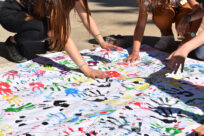
Student Art Festivals bring “Together!” local communities
3 May 2023Joint Press release
-
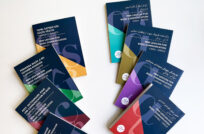
UNHCR launches updated edition of “Mini Lexicon for Basic Communication”
12 Apr 2023“Where can I get milk for my baby?” “What are my rights as a refugee?” “I need your help please” These are some common questions that refugees and asylum-seekers need to express but the language barrier often prevents them from communicating even their most basic needs. Many more words, terms […]
-
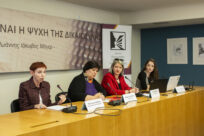
Racist Violence Recording Network: Presentation of the Annual Report for 2022
6 Apr 2023Racism and targeting of human rights defenders erode victims’ safety and sense of justice
-

‘WELCOME 2023’ Career Days in Athens
23 Mar 2023For the third consecutive year, with the participation of 42 companies and emphasis on women’s empowerment
-
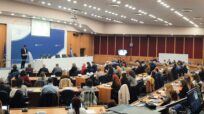
Joint Press Release: Conference on the National Emergency Response Mechanism for the protection of unaccompanied minors
7 Mar 2023The Special Secretariat for the Protection of Unaccompanied Minors (SSPUAM), the Representation of UNHCR in Greece and Panteion University of Social and Political Sciences successfully organized on 7 March a conference titled “National Emergency Response Mechanism for the protection of unaccompanied minors: from needs assessment to response“. The National Emergency […]
-
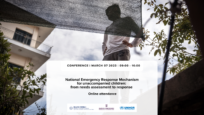
Invitation to Conference “National Emergency Response Mechanism for unaccompanied children: from needs assessment to response”
3 Mar 2023The Special Secretariat for the Protection of Unaccompanied Minors in Greece (SSPUAM), the UNHCR Representation in Greece and Panteion University of Social and Political Sciences are organizing on Tuesday 7 March 2023 a conference titled: “National Emergency Response Mechanism for the protection of unaccompanied children in precarious living conditions (NERM): […]
-

UNHCR’s Innovation Fund awards projects designed by refugees for refugees
3 Mar 2023A new Refugee-led Innovation Fund from UNHCR, the UN Refugee Agency, has awarded 17 organizations hundreds of thousands of dollars to improve the lives of displaced people and host communities. From an initiative equipping stateless people in Italy with the advocacy skills they need to change the narrative on statelessness, […]
-
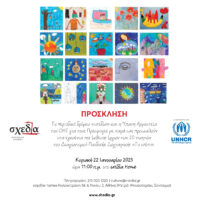
Art exhibition with the works of the 20 finalists of “Shedia” children’s drawing contest
18 Jan 2023Art exhibition with the works of the 20 finalists of “Shedia” children’s drawing contest organized in cooperation with UNHCR Opening: Sunday, 22 January, 11:00 “Shedia” street paper was filled with homes. Small homes, big homes, country and urban homes, homes filled with people and colour, empty and gloomy homes, warm […]
-

Invitation to participate in Video and Storytelling Lab
1 Dec 2022UNHCR, the UN Refugee Agency, and KARPOS – Center of Education & Intercultural Communication are pleased to announce the launch of an interactive Video and Storytelling Lab, in Athens. The Lab aims to: Explore various visual story-telling techniques and tools, in theory and in practice Enhance participants’ technical skills in […]
-
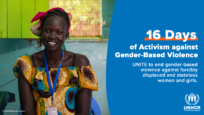
UNHCR warns rising tide of hunger, insecurity, and underfunding worsening gender-based violence risks
25 Nov 2022Worsening socio-economic conditions, new and ongoing conflicts and humanitarian funding shortfalls are increasing the risk of gender-based violence for forcibly displaced women and girls, UNHCR, the UN Refugee Agency, is warning today. “A toxic mix of crises — conflicts, climate, skyrocketing costs, and the ripple effects of the Ukraine war […]
